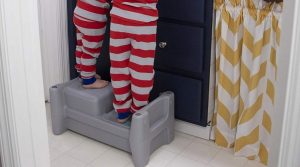Let’s talk about bedwetting. That pesky, frustrating childhood problem that very few people openly discuss for fear of embarrassing their kids. The good news is: you (and your child) are not alone. Bedwetting occurs in about 15-20% of kids ages 5 and older. The better news: most children naturally outgrow bedwetting, with an additional 15% staying dry each year as they get older 1Mikkelsen, E. J. (2006). Waking Up Dry: A Guide to Help Children Overcome Bedwetting.
chop.edu
If you and your child want to tackle the problem, whether due to embarrassment, too much laundry, or their budding social life, we have some information and steps to take that will help you along in the process.
In this article:
Keep in mind
Bedwetting, also known as nocturnal enuresis, is a common occurrence, especially in young boys.2How to Help Your Child Stop Wetting the Bed
health.clevelandclinic.org It often runs in families and most children will outgrow it if given time. Tackling daytime potty training does not ensure that your child will stop wetting the bed. Many kids struggle to hold their urine for that long or wake up and get to the toilet in time.
While it’s usually not cause for concern, it can result in low self-esteem and embarrassment for older kids. Bedwetting can hold them back from sleepovers or camps, and it’s incredibly frustrating for parents washing sheets and wondering if there’s a solution.
It helps to communicate with your child, reassuring them that bedwetting is common, normal, and not their fault. It may be hard, but try not to get angry or punish your child. After all, they’re asleep when this is happening and don’t like it any more than you do.
Bedwetting medications are typically not recommended, as they’re a quick fix with side effects that don’t address the underlying problem. However, there are a few things that you can try.
What causes bedwetting?
Bedwetting can be caused by:
- The mechanisms that control the bladder failing to mature (simply put- an immature bladder)
- Genetics- passed down from a family member
- A small bladder or not producing enough vasopressin to slow urine output while sleeping
- Sleeping so deeply that having to pee doesn’t rouse them
- If your child begins wetting the bed after not doing so for 6 months, it may be due to stress, trauma, or life changes (big or small)
- There are a few health issues that can cause bedwetting, which we’ll cover
Bedwetting tips
- Invest in a few good mattress protectors. Find one that is extremely waterproof, soft, and non-crinkly. You can also double up, using a mattress protector and sheet followed by another mattress protector and sheet. When accidents occur, strip off one of the layers.
- Try training pants. Some brands make them for older children, but they will likely cause more embarrassment than it’s worth as your child reaches about age 8.
- No drinks an hour before bedtime. Try to shift to your child drinking more before lunchtime and less as the day progresses. Don’t make a big deal out of restricting drinks, or they may see it as a punishment.
- According to Dr. Charles Kwan, MD, your child should avoid bladder irritants like caffeine, found in chocolate and soda. Lesser-known bladder irritants include artificial flavorings, dyes, sweeteners, and citrus juices.
- Try implementing an earlier bedtime. Sometimes kids sleep very deeply because they’re not getting enough sleep. Encourage healthy bedtime habits like a bedtime routine that does not include screens.
- Lastly, try to be aware of their bowel movements. If your child is constipated, the rectum will press against the bladder, causing accidents, particularly at night.
Related: What Do I Do When My Toddler Withholds Bowel Movements?
Ways to stop bedwetting
There are a couple of tried and true methods that can speed along the process. While they don’t work for every child, many parents have found success.
Bedwetting alarm
A bedwetting alarm is the most effective way to stop bedwetting in older children, but it’s not a quick fix. It can take anywhere from a few weeks to a few months to stop bedwetting altogether. One study found that 79% of 505 children who wore a bedwetting alarm stopped wetting the bed within 10 weeks.3Bedwetting Solutions: How Can You Stop Bedwetting?
webmd.com
This tool has a moisture sensor that triggers an alarm when moisture is detected. You clip it onto your child’s underwear (not training pants!), and as soon as they begin to wet the bed, the alarm goes off. In theory, the alarm will wake them, and they will go to the bathroom to finish peeing.
Over time, it teaches kids to wake up and go to the bathroom instead of wetting the bed and eventually even sleep through the night without peeing. It’s recommended that you don’t turn off the alarm until after they have finished peeing on the toilet. Make sure to rinse the urine off of the metal plates on the sensor every day.4Using a Bed-Wetting Alarm
cincinnatichildrens.org
Another (free) method is to set an alarm to wake your child up about three hours after they have fallen asleep. Some doctors don’t recommend this because it can cause sleepy frustration on both ends, but it may be worth attempting before the bedwetting alarm. For both alarm methods, you can praise or reward dry nights with small dollar store prizes.
Bladder training
Bladder training can teach your child to use the bathroom more often and how to hold in pee for a few minutes when necessary. Have them pee every 2-3 hours, even if they don’t think they have to go. Most necessary is making sure they go one hour before bedtime and then again right before bedtime.
While this definitely won’t work for every child, you can also try having them hold their pee for an additional 5-10 minutes after they tell you that they need to go during the day, training their bladder in the process.
I have also personally found that if your child is holding their pee during the day, it can increase the chances of a bedwetting incident. After starting kindergarten, one of my children regressed and started bedwetting frequently. They shared with me that they had only been going to the bathroom once during the school day! Discuss with your child how important it is to use the bathroom at school, and reach out to their teacher or school nurse if necessary.
When to see a doctor
If your child is older than 5, it certainly can’t hurt to bring it up with your doctor to get their opinion, especially if it’s causing a lot of embarrassment for your child. If your child is nearing 7 or stopped bedwetting and began again, it’s definitely time to discuss it with your pediatrician.
There are medical conditions that can cause bedwetting, such as chronic constipation, UTIs, sleep apnea, or diabetes. Be on the lookout for painful urination, frequent thirst, hard stools, and snoring.5Monda, J. M., & Husmann, D. A. (1995). Primary nocturnal enuresis: a comparison among observation, imipramine, desmopressin acetate and bed-wetting alarm systems. The Journal of urology, 154(2), 745-748.
health.ucdavis.edu
Remember that like most things your child will go through, this feels very stressful now (and it is!), but it’s typically an issue that will resolve itself with time.








